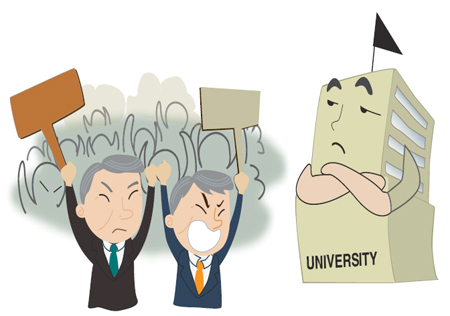
Tension runs high at state colleges
Professors outraged over scrapping of direct vote to pick president
Professors of state-run universities are up in arms over the government’s move to deprive them of the right to choose presidents of their own schools.
Tension is escalating between professors and school authorities at some regional colleges since the prosecution raided the offices of several professors and the president-elect of Chonnam National University (CNU), located in Gwangju, last month. They have also been summoned for questioning over allegations that they engaged in irregular deals in the process of picking their president.
Professors at the school are outraged. Their council issued a statement last week to denounce the prosecution’s investigation, alleging that the education ministry was behind it.
“The probe was politically motivated to stop us from selecting our own president. The election was transparent and fair. We can prove it,” the council said.
CNU is not the only school that is in a whirlwind of internal conflict over whether to preserve the direct election system, introduced in 1991 to enhance academic autonomy.
Changing the way presidents are picked at state schools is the centerpiece of Education Minister Lee Ju-ho’s college restructuring plan. The ministry sees the direct election system as hampering the development of colleges and factionalizing faculties, but professors are resisting the move.
Chonbuk National University also plans to scrap the system and instead set up an evaluation committee to choose its president. However, a majority of professors there have protested the plan.
Kyungpook National University (KNU) recently changed school regulations to accept the government’s demands despite protests from the professors’ council. Under the revised rules, the school would create a panel to evaluate presidential candidates. To implement the new rules, the school is required to get consent from professors, but a majority has opposed changing the rules.
Under the direct election system, state schools elect presidents through direct voting by professors and school staff. However, there have been reports of bribery scandals involving candidates and factional fighting among faculty members ahead of elections.
According to the schools, if they don’t discard the system by the end of August, there could be forceful restructuring by the government. “That means that there will be less of a state subsidy for us,” a CNU official said.
Professors claim that the government is tightening its grip on state universities, using subsidies.
Last year, the ministry picked five “noncompetitive” state universities that would face rigorous restructuring and financial restrictions. The measure came after it decided not to give subsidies to 43 private colleges. The blacklisted schools claimed that the methods and standards the government adopted to rate schools were biased, but the ministry dismissed these allegations, vowing to press ahead with the restructuring.
The ministry plans to choose more noncompetitive state-run and private schools this year.
One of the requirements the ministry asked state schools to meet in order to get high scores was the abolishment of the direct election system.
Last year, the ministry vetoed Pusan National University’s plan to appoint a professor as its new president. The professor, surnamed Chung, was elected to the post in June last year in a direct vote by faculty members, but was later convicted of an Election Law violation and fined 4 million won.
“We proposed the creation of an emergency committee to discuss how to choose president and map out long-term plans for the school’s future, but the school authorities as well as the education ministry have showed lukewarm attitude,” a KNU professor said.
“State-run schools are not profit-oriented and each school has its own function. However, the government is ignoring this fact.”
Restructuring drive
Minister Lee has said the government’s ongoing college restructuring is not temporary, but part of a long-term strategy aimed at enhancing the overall competitiveness of local institutions of higher education.
“There is misunderstanding among some people that our reform plan will be short-lived. But this is not the case,” Lee said during a recent meeting with the presidents of 38 state universities.
The ministry announced a plan last year to introduce a merit-based wage system for professors at state colleges. It also plans to shut down poorly-managed universities and kick out corrupt managers. Professors have criticized it for introducing competition-oriented programs for state schools, ignoring the unique roles they have played in the country’s education.
“The government has often been blamed for lax oversight of state-run schools. We are paying attention to the calls that the government’s reform should begin with efforts to improve the efficiency of state-run colleges and strengthen monitoring of their operations before reforming the private sector,” a ministry official said.
“One of the administration’s key policy goals is to enhance the overall competitiveness of the country’s education to meet the needs of parents and students. That’s why we are concentrating on restructuring state colleges.”
The official dismissed allegations that the ministry is coercing schools into abolishing the direct election system, saying they have done so “voluntarily.” <The Korea Times/Na Jeong-ju>


